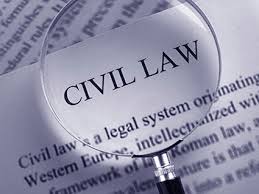Civil Lawsuit vs. Criminal Case: Key Differences Explained
Civil Lawsuits: A Comprehensive Guide

Civil Lawsuits are an essential component of the legal system, allowing people, businesses, and organizations to settle non-criminal issues in court. Civil lawsuits deal with private disputes between parties, as opposed to criminal proceedings, which are tried by the government and include violations of public law. What a civil lawsuit is, how it operates, and what you should know if you’re involved in one will all be covered in this article.
A Civil Lawsuit: What Is It?
Any legal disagreement involving two or more parties seeking restitution, the enforcement of a legal right, or another non-criminal remedy is known as a civil lawsuit. People, companies, or governmental organizations may be involved in these cases. When one party (the plaintiff) feels that another party (the defendant) has injured or hurt them and wants the court to step in, civil cases are usually filed.
Typical Civil Lawsuit Types:
A variety of disputes may be involved in civil cases, such as:
- A breach of contract occurs when one of the parties to a legal agreement does not carry out their end of the bargain.
- Personal injury claims are those that result from mishaps, carelessness, or medical malpractice.
- Property conflicts are disagreements about property damage, boundaries, or land ownership.
- Employment concerns include wage disputes, unlawful termination, and workplace discrimination.
- Family law concerns include divorce, child custody, and alimony (although they are frequently handled independently).
- Defamation is when someone’s reputation is harmed by slander or libel.
Procedures for a Civil Case:
- Complaint filing: By submitting a complaint detailing the legal difficulties and the remedies they are seeking, the plaintiff starts the litigation.
- Assisting the accused: Through the procedure known as service of process, the defendant is formally informed of the lawsuit.
- Reaction or Answer: In a written response, the defendant must acknowledge or refute the accusations.
- Phase of Discovery: To get ready for trial, both sides collect evidence, trade papers, and take depositions.
- Motions Before Trial: Attorneys might restrict the topics or file motions to dismiss the case.
- Exam: The matter goes to trial if a settlement cannot be reached. After considering the facts, a judge or jury renders a decision.
- Evaluation: The defendant may be required to take certain actions or receive monetary compensation as part of the court’s verdict.
- Appeal (if relevant): If either side feels that there were legal mistakes in the ruling, they may appeal it to a higher court.
Results of Civil Cases:
The majority of civil cases end without a trial. They are frequently fixed by:
- Settlements are agreements made between parties without the need for a court ruling.
- Alternative conflict resolution procedures that are quicker and less expensive include arbitration and mediation.

Why Bring a Civil Case?
Civil lawsuits are filed by people to:
- Recover monetary losses
- Protect legal rights
- Put an end to negative conduct
- Address injustices
- Acquire legal recognition (such as contract rights or property ownership).
Employing a Lawyer for Civil Litigation:
Civil litigation can be complicated. Your chances of success might be significantly raised by working with an experienced civil litigation lawyer. A skilled attorney can:
- Consider your case.
- Manage legal documents
- represent you in court.
- Discuss settlements.
- Help you navigate the judicial system
In conclusion:
Civil litigation are essential for settling conflicts and maintaining social fairness. Knowing the procedure is crucial whether you are being sued or are thinking about bringing a case. You can defend your rights and get a just result if you have the appropriate information and legal assistance.

Post Comment